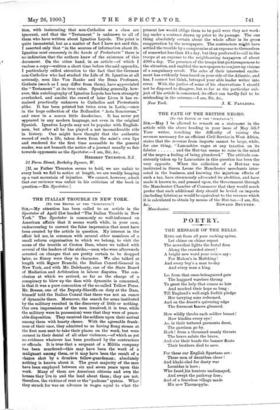THE FATE OF THE BRITISH NEGRO.
[TO THE EDITOR OF THE "SPECTATOR.")
Sin,—May I be allowed to remark on a statement in the article with the above heading in your issue of May 5th ? Your writer, touching the difficulty of raising the revenue necessary for an efficient Civil Service in West Africa, states that the revenue from imports cannot be large, while, for one thing, "Lancashire rages at any taxation on its fabrics and the Hut-tax seems to raise in the mind of the negro a feeling of being plundered." The attitude con- sistently taken up by Lancashire in this question has been the very opposite. When the collection of a Hut-tax was instituted in Sierra Leone the Manchester merchants inter- ested in the business, and knowing the injurious effects of such a tax, have strenuously advocated its abolition, and have made it known to, and pressed upon, the Government through the Manchester Chamber of Commerce that they would much prefer that such additional duty should be levied on imports (including fabrics) as would be equivalent to the revenue which it is calculated to obtain by means of the Hut-tax.—I am, Sir, • Manchester. EDWARD BRUNNER.






































 Previous page
Previous page